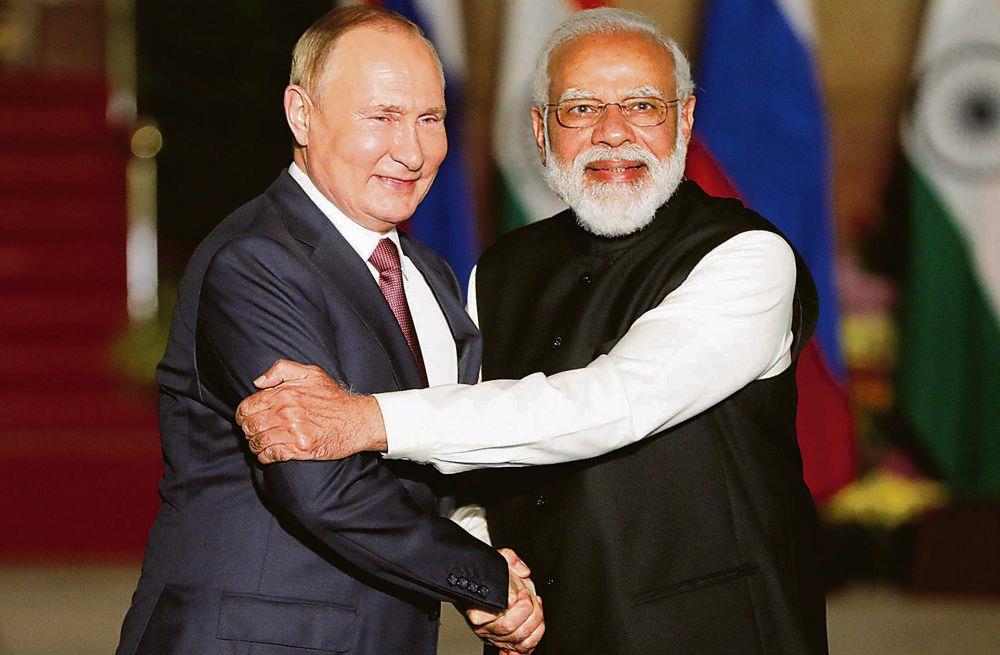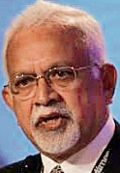
Unwary: Russia is not paranoid about India’s close ties with the US. Reuters
MK Bhadrakumar
Former Ambassador
Russian President Vladimir Putin’s visit to India took place on the eve of his videoconference with his US counterpart Joe Biden which turned out to be a fateful event in post-Cold War geopolitics. But in the Indian context, the deal over the Russian S-400 missile defence system became the leitmotif of the visit. Washington has been coaxing Delhi to abandon the deal, since it violated US law. The Indian diplomacy tactfully sidestepped the hump.
The timing of Putin’s visit underscores that India can’t be hustled into a military alliance or lured into jettisoning its strategic autonomy.
The US must be feeling frustrated that the deployment of the S-400 system will effectively close the Indian market for its pricey F-35 stealth aircraft, erode significantly the potential for ‘interoperability’, cement India’s strategic engagement with Russia in the military sphere for the foreseeable future and strengthen Russia’s defence industry. Looking ahead, settlement of payments in local currencies in bilateral transactions will help create a firewall against the weaponisation of the dollar by the US for coercive diplomacy.
In reality, although India-China border remains tense, peace prevailed through the past one-year period, and that also seems to be a common desire, the adversarial posturing notwithstanding. In strategic terms, the navigation of the S-400 deal ultimately becomes a litmus test of the inherent strength and resilience of India’s strategic autonomy, apart from throwing light on the alchemy of the India-US ties beneath the confusing rhetoric of lobbyists.
The single biggest message coming out of Putin’s visit is that the Russia-India partnership — if the 1971 Treaty of Peace, Friendship and Cooperation and the 2000 Declaration on Strategic Partnership are to be taken as the historical landmarks — remains dynamic, mutually beneficial and is constantly ‘upgraded’ in terms of the evolving international environment. Its timing underscores that India cannot be hustled into a military alliance or lured into jettisoning its strategic autonomy despite the consensus opinion within India favouring a productive partnership with America being vital for development.
Delhi hosted the first meeting of the foreign and defence ministers in a ‘2+2’ format with Russia at a highly sensitive juncture in international politics, with Russia-US tensions at an all-time high. This symbolically rejects the US’ demonisation of Russia and constitutes a compelling signpost on India’s non-aligned foreign policies.
The joint statement highlights the Russia-India perspective on emerging regional security architecture in Asia-Pacific — that it ‘should be free, open, transparent and inclusive, based on universally recognised principles of international law and aimed at maintaining international peace and security, developing friendly relations and mutually beneficial cooperation in the region’ — and states the common resolve ‘to strengthen joint efforts to build an architecture of equal and indivisible regional security.’
In every single foreign policy speech recently by Putin, he made it a point to highlight the Russia-India partnership. The steady enrichment of India’s relations with Russia should be counted as a singular achievement of PM Modi’s diplomatic agenda. The warm personal equations between Modi and Putin continue to be the bedrock of bilateral cooperation. The strategic communication is being elevated to its highest possible level with the institutional arrangements to hold meetings in the ‘2+2’ format and between the two national security advisers and National Security Councils.
The trajectory is looking up for bilateral cooperation in energy and space. Civil nuclear energy is potentially a key template of cooperation. The military and military-technical cooperation continues to be the pillar of the Special and Privileged Strategic Partnership. Around 60-70% of weapons used by the Indian armed forces are of Russian origin. Putin’s visit underscores that a reorientation of defence cooperation is seriously underway to cater to India’s quest for self-sufficiency. The accent is on joint research and development, co-development and joint production of advanced defence technology and systems.
Moscow sees no reason to get paranoid about India’s close ties with the US. That said, the geopolitical backdrop has become noticeably complicated as a result of a number of other issues. The confrontation between the US on one side and Russia and China on the other has resulted in the US attempting to separate India from Russia and to exploit to its advantage the Sino-India tensions, which are at their worst in half a century, to create gravitas for Washington’s Indo-Pacific strategy. But the known unknown is also that the frontiers of Sino-India relations are far from explored. The point is, beneath the radar, China’s trade with India is set to cross the $100-billion mark for the first time in 2021 and the figures with India are among the fastest-growing among China’s major trading partners.
In the context of the hostile mode of its ties with the US and the imbalance in the Sino-Russia partnership, Russia too has a requirement to refine its engagement with India and inject greater transparency to their mutual discourses. Russia’s latest National Security Strategy identifies the ties with both Delhi and Beijing as priorities. These positive trends get obfuscated in the US-driven narratives regarding Indo-Pacific, which are both China-centric and also subtly laden with Russophobia.
The Sino-Russia relationship stands at its highest level in history, but Moscow’s preference is, nonetheless, to remain neutral vis-a-vis China’s rising tensions with Washington. Ideally, Russia would have preferred to be a ‘balancer’. It is against such a complex backdrop that Putin’s recent reference to India as a ‘great power’ needs to be understood. The Russian diplomatic idiom has unique connotations.
Join Whatsapp Channel of The Tribune for latest updates.




























